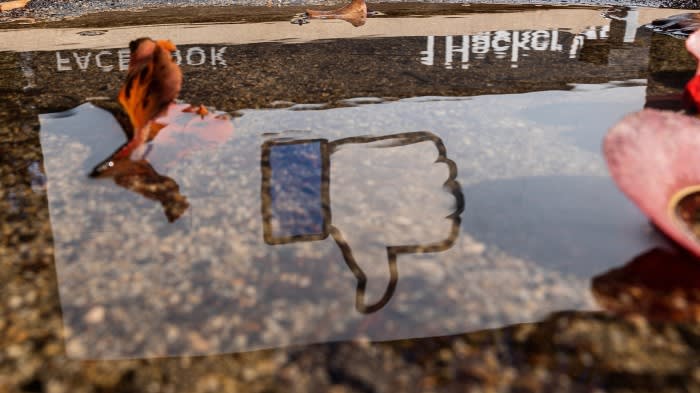Unlock the Editor’s Digest for free
Roula Khalaf, Editor of the FT, selects her favourite stories in this weekly newsletter.
“The internet is getting worse, fast,” says Cory Doctorow at the start of this book, a broadside against the world’s biggest technology companies. His argument is simple: Apple, Alphabet, Amazon, Meta and others have become so big and so unaccountable that they can degrade their services, with few consequences.
Doctorow sees the process as having three stages. First, the companies are good to their users. Second, they abuse their users to benefit their business customers, often advertisers. Third, they abuse those business customers. By this point, they have “enshittified”. A lack of meaningful competition and regulation means they can still increase profits.
A blogger and longtime internet activist, Doctorow knows the terrain intimately. He cites punchy examples of internet decay. Google decided to make search results worse, so that users would perform additional searches and it could show them more ads. Google executive Michael Roszak even said that the company could “ignore one of the fundamental laws of economics . . . supply and demand”. (Roszak has said he was using hyperbole.)

On Amazon, the top search results are more expensive and sometimes fraudulent; the product you want is, on average, 17th in the results. Facebook went wrong more than a decade ago, doing things like pushing publishers to post more and more of their articles free. Apple surveils its users as much as Facebook, and refuses to let companies sell refurbished iPhone parts. It lured customers “into its walled garden, which was then revealed to be a prison”, writes Doctorow. Now car companies like Tesla charge drivers monthly subscriptions for features of vehicles that they have already bought.
Doctorow coined the term “enshittification” in a blog in 2022. Not everyone will like his scatology. But he certainly knows how to make an idea memorable. You could not ask for a clearer, more ambitious or better-written business book than this one. Of corporate mergers and acquisitions, Doctorow writes: “Whole sectors grew so inbred that they developed the corporate equivalent of a Habsburg jaw.”
In another blog he argued that enshittification was leading to Facebook and X/Twitter going the way of MySpace, which went into decline after taking its users for granted. In the book, Doctorow changes tack, arguing that the platforms can thrive regardless. Despite Twitter’s descent under Elon Musk, who bought the platform in 2022, people “still use” the site. Doctorow confesses he is one of them, because of switching costs and collective action problems.
Does Enshittification over-reach? The economist Paul Krugman has actually argued that the theory could apply more widely, beyond the tech sector. But some critics may chafe at Doctorow’s insistence that digital services can be regulated like physical ones.
The book does not allow itself to be slowed down by evidence: this keeps the reader entertained, but also creates questions about cherry-picking. For example, Doctorow cites how consumer goods company Procter & Gamble once cut $200mn in digital ad spending without losing sales. But although ad fraud is a huge issue, ultimately P&G and others do find that targeted ads work.
Another questionable claim is that tech workers were once a bulwark against enshittification, but then started worrying about their own jobs. Isn’t it plausible that many tech workers weren’t idealistic? Doctorow’s disdain can be scattergun: he claims the former UK Liberal Democrat leader (and former Meta executive) Nick Clegg can “largely be blamed” for Brexit as he gave his support for a referendum on Britain’s membership of the EU.
The solution to enshittification, says Doctorow, is better regulation. He celebrates the Biden administration’s efforts, including the antitrust work of its Federal Trade Commission chair, the “extraordinary” Lina Khan. He sees a growing global movement to tame Big Tech, for example to establish a right to repair, increase interoperability between providers, and pass privacy laws. The key question for any regulation is: “Does it make the platforms weaker?”
The book’s timing is awkward. First, there’s the switch to the Trump administration. Doctorow sees some signs that vice-president JD Vance and others are prepared to continue Khan’s agenda; that seems over-optimistic. Either way, judgment can only be partial.
Second, AI chatbots are changing the internet. How do ChatGPT and others fit into the theory of enshittification? Are they starting off good, then abusing users? Or are they already acting as abusers by hoovering up copyrighted material and by cutting off search traffic to publishers? Doctorow has little to say.
Overall, however, Doctorow deserves thanks for his service. He discusses his refusal to distribute audiobooks on Audible because every one is locked on to Amazon’s platform. (He says that the punishment for downloading a pirated ebook is lower than that for helping someone circumvent the limits on an ebook they’ve bought via Amazon.) The revenue he has forgone would have paid off his mortgage, his agent is quoted as saying. This principled sacrifice is presumably the opposite of enshittification. It wouldn’t be necessary if our regulators put the public first.
Enshittification: Why Everything Suddenly Got Worse and What to Do About It by Cory Doctorow Verso £22/Farrar, Straus and Giroux $30, 352 pages
Henry Mance is the FT’s chief features writer
Join our online book group on Facebook at FT Books Café and follow FT Weekend on Instagram, Bluesky and X
